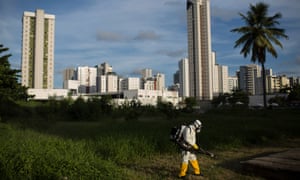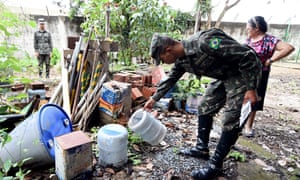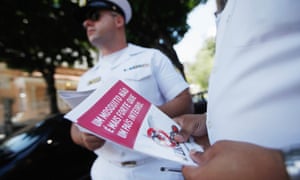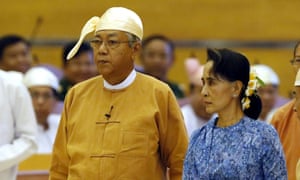Zika virus command center leads biggest military operation in Brazil's historyIt is the biggest military mobilisation in Brazil’s history: 220,000 army, navy and air force personnel have been called into action, as well as 315,000 public officials.
Rapid reaction units have been deployed to take the fight across the country. Local authorities are stockpiling munitions and supplies. Scientists have been enlisted to devise new weapons of mass destruction with which to defend the motherland.
But the enemy is not a geopolitical rival or a militant group: it is the tiny Aedes aegypti mosquito which is believed to be responsible for the spread of the Zika virus.
The war room where this battle is being coordinated is the Zika Control Room inside the National Centre for Risk and Disaster Management in Brasília. On one wall is a bank of 15 screens showing weapons stockpiles, troop numbers and indicators of where the enemy is concentrated.
In the middle is a U-shaped dark wooden desk with 14 chairs, each with a phone and broadband socket. The occupants wear uniforms: khaki for the army, blue for civil defence and casual dress for officials from the health, education and social development ministries.

A municipal health worker sprays insecticide in an open area of a sports facility in Recife, Pernambuco state. Photograph: Felipe Dana/AP
These bureaucrats describe themselves as soldiers. “This is a war. Our enemy is very dangerous,” says Fábio de Abril Luna, an education official who pulls together material to inform and motivate the public. He is proud of the work they have done since being formed in December. Graphs on the screen show Zika-busting missions have reached more than 90% of the 67m buildings in
Brazil in the first of at least three cycles of inspections.
Another graph show that stocks of the main insecticide – pyriproxyfen (which is sprayed into the air from fumigation vehicles in the worst-affected areas) – have been more than doubled to 31,410kg, while the holdings of larvicide Malathion have been ramped up by 63% despite import problems (the chemical, which is produced in Germany, has to be shipped by sea because France deems it too dangerous to fly through its airspace).
Marcos Quito, the coordinator of the Zika Control Room, says many other weapons have been tried or are being tested, including larvae-eating sambo fish and Crotalaria plants that attract dragonflies that like to feast on larvae. More drastic measures are also under development with the encouragement of the World Health Organisation.
In Pircicaba city, São Paulo state, the authorities have released more than 20m male mosquitoes that have been genetically modified by UK-based Oxitec to mate with females and produce offspring that fail to reach adulthood. The company says this has reduced larvae in the area by 82%.
Other firms have irradiated mosquitoes to be sterile. The long-term consequences of releasing an army of transgenic or irradiated mosquitoes are still being studied, but if the epidemic worsens so will the pressure to use relatively untried alternatives.
“I can’t say what we would do in the future. We would need to make a new risk assessment and judge whether the benefits of using more powerful weapons would outweigh the added risks to the public,” said Quito.

Armed forces members check a house for mosquito breeding areas in a rural area in Brazlândia, 45km northwest of Brasília. Photograph: Evaristo Sa/AFP/Getty Images
For the moment, however, he said the most effective way to tackle Aedes aegyptiis to mobilise the public. Two-thirds of the mosquitoes breed in and around people’s homes in water tanks, ponds, discarded bottles, plant pots and discarded tyres. Clean them up and the risks are reduced enormously.
Focusing the war effort is also important. Heat maps show the epidemic is concentrated in Pernambuco and elsewhere in the north-east, where Zika was first identified and more than 80% of microcephaly cases have been confirmed. The good news is that the weekly numbers of microcephaly cases already appear to have peaked in this area.
The bad news is that more cases are being reported elsewhere.
“We see a trend of spreading,” said Claudio Maierovitch, director of the department of vigilance for transmittable diseases in the ministry of health. “Just as with Zika last year, microcephaly started in the north-east and is now spreading across the whole country.” In the coming months, he expects an increase in cases in areas that haven’t so far reported many cases, such as São Paulo and Minas Gerais.
The moving frontline is not the only problem in targeting the enemy. So little is known about Zika that it has to be fought at one or two removes. Instead of the pathogen itself, the campaign aims at its closest known disease – dengue – and the mosquito that carries them both. This approach, which is akin to shadow boxing, has obvious shortcomings: enemy numbers are unknown. Their whereabouts can only be guessed. The threat they pose is still uncertain.
A causal association with birth defects such as microcephaly is not yet scientifically proven but it is deemed a certainty by officials. Government figures released on Tuesday show there have been 944 confirmed cases of microcephaly and another 4,291 suspected cases. But the numbers of people with Zika are unknown because 80% of infections produce no symptoms.
In the other 20% of cases, the rashes, headaches and fever are so similar to dengue that it can be hard to distinguish between the two. As a result, the government has yet to release figures for the number of infections. Instead their best guess it that is in the region of 1.5 million people. These estimates should improve. Earlier this month, the government made reporting of Zika cases obligatory and it is dispatching 250,000 testing kits to regional authorities.

FacebookTwitterPinterest Brazilian navy sailors prepare to pass out pamphlets warning of the dangers of the Zika virus and how to protect against mosquitos in Rio de Janeiro. Photograph: Mario Tama/Getty Images
“The Aedes aegypti is a very cunning mosquito that takes advantage of human behaviour. We are dealing with a formidable enemy,” Margaret Chan, the head of the World Health Organisation, declared last month in Rio. She went on to describe Zika as a “menace on a bigger magnitude” than Sars or Ebola because of its potential reach.
The current bug war is unlikely to be the last and pressure is likely to grow to escalate the conflict with the use of riskier weapons. But, even those in command of the ongoing offensive against Zika admit it is a fantasy to think the problem can be solved this way.
After all, this is not a new fight: Brazil has been fighting the mosquito for decades and on at least one occasionthe government has declared the enemy eradicated. But each time, it has returned as strong as ever. The number of cases of dengue in the first two months of this year was more than double those during the same period in 2015 and about four times higher than in January and February of 2014.
“I can’t say with any certainty that the situation will be better next year,” says Quito. “Honestly, I don’t know when this war will end. It’s likely to go on for a long time.”
Far more than the war against the bugs, he says, the priority is to reform human behaviour.
“This is not just about Zika and it is not just about Brazil,” Quito says. “This is related to the imbalance of the climate. It concerns the entire world and the response needs to be thought through as a global effort.”
– The remains of late Stephen Keshi will be buried on July 29 at Illah, Delta state – Burial activities of the late tactician is slated between July 28 and 31 – Keshi died in Benin in the early hours of June 8, 2016 The burial arrangements for late Super Eagles coach Stephen Keshi have been made public. A member of the burial committee, who is also the Delta state commissioner for information Patrick Ukah disclosed that the ceremonies will hold between Thursday, July 28 and Sunday, July 31, 2016.

































